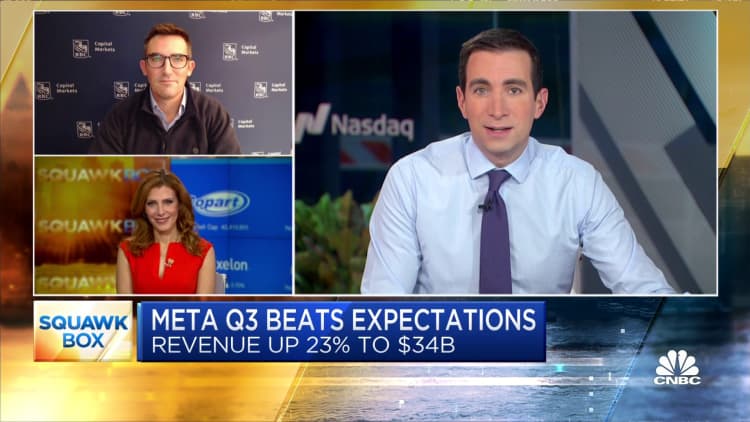
Shares of Meta closed down more than 3% Thursday, a day after the company released strong third-quarter results but offered cautious comments about potential ad softness due to the ongoing Israel-Hamas war.
Meta reported $34.15 billion in revenue for the quarter, up 23%, and the fastest rate of growth since 2021. The company's net income jumped 164% to $11.58 billion, or $4.39 a share. Both revenue and earnings surpassed Wall Street's expectations, marking a welcome change for investors after the company's core digital ads business dropped for three straight quarters in 2022.
Shares of Meta initially rose after the report but the gains were erased when Meta's finance chief Susan Li warned analysts about unpredictability in the Middle East. As a result of the conflict in Israel, Meta gave fourth-quarter guidance between $36.5 billion to $40 billion. The range is wider than the $2.5 billion gap the company typically offers.
"We have observed softer ads in the beginning of the fourth quarter, correlating with the start of the conflict, which is captured in our Q4 revenue outlook," Li said during the call with analysts.
But despite the uncertainty around the war, many analysts remain optimistic about Meta's performance.
Evercore analysts said "the BIG negative" from the call was that brand advertising demand has slowed as a result of the war. They note that Snap offered similar commentary in its recent earnings call, and said it is not unlike the advertising pause that took place after war broke out in Ukraine.
"We believe ad demand has already begun to recover at Meta," they said in a note Wednesday, adding that they "believe near-term ad market demand will be more volatile than usual."
Despite the slowing brand advertising demand, the Evercore analysts said a lot is "working" at Meta. They said AI is driving engagement, and the company's "year of efficiency" mantra is extending into years of efficiency.
Analysts at Morgan Stanley said, while Meta has seen some pause in branded advertising, they believe the company has been less impacted than others. They said Meta's AI investments and its increasing engagement on Reels remind them of when the company was first growing its Facebook and Instagram platforms.
"While all advertising may be impacted by geopolitical activity, advertising allocation remains a relative game and we believe META's differentiation gap is widening vs most peers," the analysts wrote in a Thursday note.
Analysts at Deutsche Bank said they think the fundamentals of Meta's business "remain best-in-class," and can withstand the impact of the conflict. They added that Meta's pipeline is "rich with products" like its X competitor Threads and other AI tools that could contribute to engagement and revenue.
"As such, we have growing conviction in the thesis of durable top-line growth at Meta despite near term volatility related to geopolitical uncertainty," they wrote in a Thursday note.


